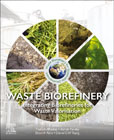
Waste Biorefinery: Integrating Biorefineries for Waste Valorisation
Bhaskar, Thallada
Pandey, Ashok
Rene, Eldon R.
Tsang, Daniel C.W.
Waste Biorefinery: Integrating Biorefineries for Waste Valorisation provides the various options available for several renewable waste streams. The book includes scientific and technical information pertaining to the most advanced and innovative processing technologies used for the conversion of biogenic waste to biofuels, energy products and biochemicals. In addition, the book reports on recent developments and new achievements in the field of biochemical and thermo-chemical methods and the necessities and potential generated by different kinds of biomass in presumably more decentralized biorefineries. The book presents an assortment of case-studies from developing and developed countries pertaining to the use of sustainable technologies for energy recovery from different waste matrices. Advantages and limitations of different technologies are also discussed by considering the local energy demands, government policies, environmental impacts, and education in bioenergy. Provides information on the most advanced and innovative processes for biomass conversionCovers information on biochemical and thermo-chemical processes and products development on the principles of biorefineryIncludes information on the integration of processes and technologies for the production of biofuels, energy products and biochemicalsDemonstrates the application of various processes with proven case studies INDICE: I General 1. Waste carbon resources for waste biorefinery: strategies for sustainable recycling 2. Sustainable development goals (SDGs) and role of waste biorefinery 3. Energy and Environment 4. Advances in Conversion processes for complex feeds/streams II Integrated Biorefineries/Waste Valorization 5. Food waste biorefinery 6. Case study: Food waste biorefinery 7. Case study: Edible crop biorefinery 8. Municipal solid waste biorefinery 9. Case studies for MSW biorefinery 10. Sewage sludge biorefinery 11. Case study of sewage sludge biorefinery 12. Pulp and Paper biorefinery 13. Aquatic biorefinery: Azolla, water hyacinth III Associated studies 14. Biorefinery emissions (e.g., Greenhouse gases, LUC, ILUC, LCS, etc.) 15. Techno-economic studies 16. Life-Cycle Analysis: Present status and challenges 17. Footprints (e.g., Carbon and water, etc.) 18. Balances (e.g., Energy and exergy, etc.) 19. Supply chain optimization
- ISBN: 978-0-12-818228-4
- Editorial: Elsevier
- Encuadernacion: Rústica
- Páginas: 820
- Fecha Publicación: 01/03/2020
- Nº Volúmenes: 1
- Idioma: Inglés
